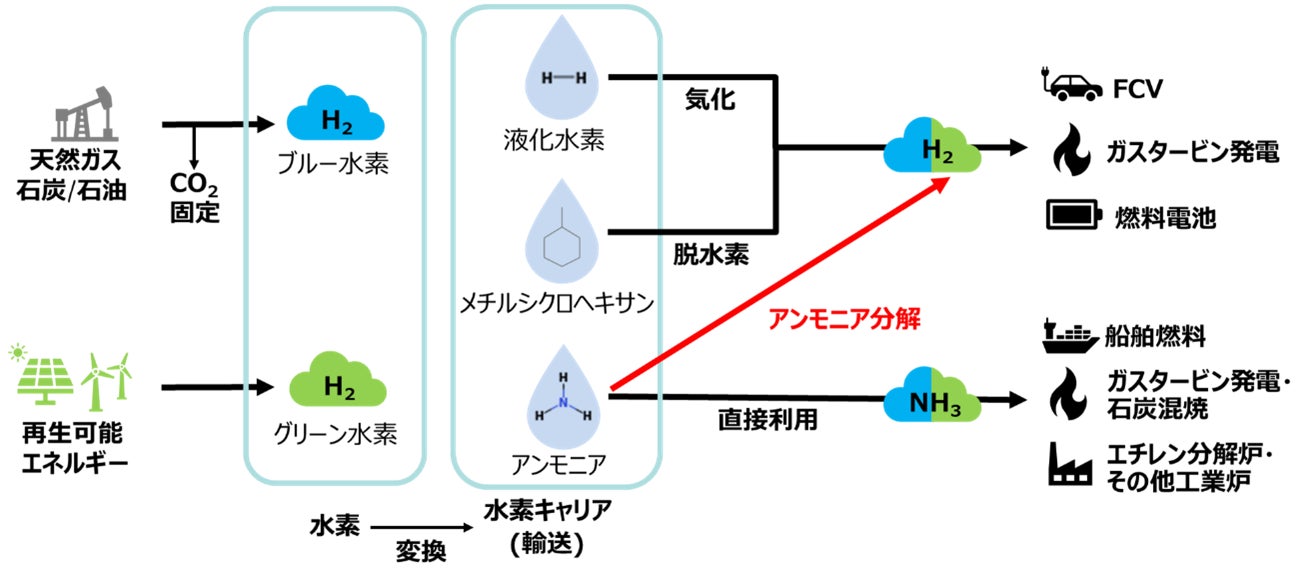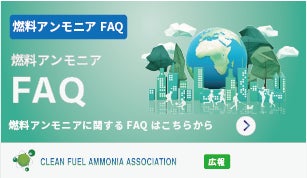東洋エンジニアリング株式会社(取締役社長 細井栄治、以下、TOYO)は、KELLOGG BROWN & ROOT LLC (President CEO Stuart Bradie、以下、KBR)と、7月26日付でKBRが保有するHydrogen from Ammonia Cracking Technology (アンモニア分解技術からの水素製造、以下H2ACT℠)の商業化推進に関する覚書 (Memorandum of Understanding) をEPCパートナーとして初めて締結しました。
低炭素社会の実現には水素エネルギーの役割が重要であり、CO₂フリー水素バリューチェーンの構築が必須となります。水素エネルギーの主なキャリアとしては、アンモニア以外にも液化水素、有機ハイドライド(メチルシクロヘキサン)が挙げられますが、アンモニアの利点として、運搬や貯蔵の容易さに加えて、アンモニア火力発電などでの直接利用に加え、アンモニアを分解して水素を取り出し水素発電や燃料電池自動車(FCV)へ適用するなど用途の広さが挙げられます。
(以下赤矢印が今回のプロセス)

当該技術による設備を主にアンモニアの受入基地に併設し、アンモニアを分解して水素を取り出すことで、将来の水素エネルギーの社会実装*1を早めることが期待されます。
KBRは世界トップシェアのアンモニア製造プロセスライセンサーとしての高い技術力を保有しています。また、TOYOは55年に渡る同社技術プラントの建設・運転実績に豊富な経験・技術知見を保有*2しています。両社の優位性を生かすことにより、カスタマイズされた高い効果が得られる技術解決案の提案、総合的なプラント建設力を発揮できることから、共同してH2ACT℠の商業化導入を推進すべく上記覚書締結に至りました。
各社の役割
KBR : ライセンサーとしてH2ACT℠の最適設計実施
TOYO : H2ACT℠商業機の詳細設計とEPC
TOYO & KBR : 社会実装に向けた顧客開拓
H2ACT℠ は “Ready to license and guarantee today” (「今日現在でライセンス供与と性能保証が可能』)とKBRは明言しております。TOYOとKBRは、H2ACT℠の更なる商業化推進のため、顧客開拓活動も含めて覚書を締結しました。

TOYOとKBRは、今回締結の覚書を通して、H2ACTSM技術の社会実装を推進することで、脱炭素社会の実現に貢献してまいります。
*1 国内においては、日本政府が掲げる「2050年カーボンニュートラルに伴うグリーン成長戦略」に基づき、水素の国内導入量を2030年で最大50万トンとする目標が定められています。また、「水素基本戦略」が改訂され2040年の水素供給量の目標は年間1,200万トンとなっており、水素製造技術の開発、社会実装が課題となっています。
*2 TOYOはKBRと55年に渡る協業体制を構築しており、全世界で87基のアンモニアプロジェクト実績があり、豊富な技術知見を有しています。アンモニア合成技術に加え、アンモニア分解技術を両社の協業対象に加えることで、水素も含む燃料アンモニアバリューチェーンの構築に貢献します。
■━━━━━━━━━━━━━━━━━━━━━□
┃ 燃料アンモニアに関する情報はこちらから ┃
□━━━━━━━━━━━━━━━━━━━━━■
▼燃料アンモニアとは?

▼よくある質問

English Follows
ーーーーーーーーーーーーーーーーーーーーーーーーーーーーーーーーーーーーーーーーーーーーーーーーーーー
Toyo Engineering Corporation (TOYO, President & CEO Eiji Hosoi) announced today that it reached a Memorandum of Understanding (MOU) with KELLOGG BROWN & ROOT LLC (President CEO Stuart Bradie, KBR) as the first EPC partner to accelerate commercialization of KBR’s licensed technology, “Hydrogen from Ammonia Cracking Technology (H2ACT℠)” on July 26th, 2023.
The role of hydrogen energy is crucial to the realization of a low-carbon society, and the deployment of a CO₂-free hydrogen value chain is essential. In addition to ammonia, liquefied hydrogen, and organic hydrides (methylcyclohexane) are the major carriers of hydrogen energy. The advantages of ammonia include ease of transportation and storage, direct use for power generation fuel, and a wide range of applications such as hydrogen-fired power generation and fuel cell vehicle (FCV) by extracting hydrogen from ammonia through cracking.
The red arrow in the figure below indicates this process.

Facilities using this technology will primarily be installed in ammonia receiving terminals. It is expected to accelerate the social implementation of hydrogen energy*1 by cracking ammonia and extracting hydrogen in the near future.
KBR has advanced technological capabilities of ammonia production process and worldwide top market share. TOYO possesses abundant experience and technical expertise cumulated through the plant EPC (engineering, procurement, and construction) with KBR in the last 55 years*2. By leveraging the advantages of both companies, KBR and TOYO will be able to deliver customized and highly effective technology solutions and demonstrate comprehensive plant construction capabilities. KBR and TOYO have concluded the above MOU to jointly promote the commercial implementation of H2ACT℠.
The roles of each company
KBR:
Provide optimized design of H2ACT℠ as licensor
TOYO:
Detailed design of commercial plant of H2ACT℠ and EPC
TOYO&KBR:
Business development for social implementation of H2ACT℠
KBR has stated that H2ACT℠ is “Ready to license and guarantee today”.
TOYO and KBR have signed the MOU to further accelerate the commercialization of H2ACT℠ including customer development activities.

Through this MOU, TOYO and KBR will contribute to the realization of a decarbonization society by promoting the social implementation of H2ACT℠ technology.
*1: “Green Growth Strategy Through Achieving Carbon Neutrality in 2050” formulated by Japanese government declared up to 0.5 million tons of domestic hydrogen utilization in 2030.
Furthermore, in “Basic Hydrogen Strategy”, the target for hydrogen supply in 2040 is 12 million tons per year. To achieve these targets, further development of hydrogen production technology and social implementation are required.
*2: TOYO has been collaborating with KBR for 55 years and possesses project experiences and knowledge with 87 ammonia plant in the world. In addition to ammonia synthesis technology, ammonia cracking technology will be added to the scope of collaboration of the two companies, contributing to the deployment of a fuel ammonia value chain that also includes hydrogen utilization.


